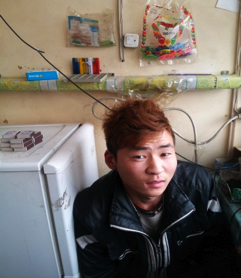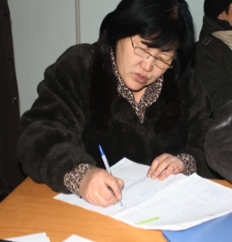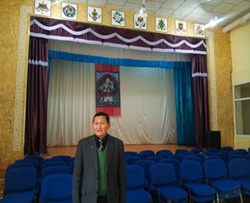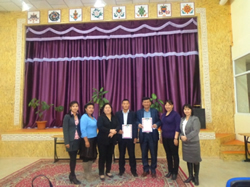E.Zorigtbaatar, Bus stop kiosk renter in 11th khroo, Songinokhairkhan District

My wife and I used to work in a karaoke bar in the city center with a salary of MNT 250,000 per month. This covered my transportation and meals but was not enough until the next payday. When I was chosen as the under the Japan-funded project, our life has become better. I started renting the space inside the bus stop shed from the CDC since September 2012 for a low rate of 50,000₮ per month but I take care of the facility in return. I started selling goods worth 100,000₮ and now I earn 50,000-55,000₮ income per day.
Now I do not have to wait for my salary at the end of the month. I can handle the urgent need for money like buying medicine for my child without any worries. I can also prepare well for the birth of my second child. Because my work is now close to my home, transportation cost is reduced. I can also manage my own work time.
I plan to expand my business. If I have more working capital, I would like to have the goods which are in demand ready at the counter like drinks and ice cream during summer so our profit will increase significantly.
Ts.Dulamsuren, 3rd Kheseg CDC Leader, Dambadarjaa Area Sukhbaatar District 17th khoroo

The Community-led Ger Area Upgrading in Ulaanbaatar City Project is being implemented in our khoroo by UN-Habitat since December 2009. We have been mobilized by the project Social Mobilizer, participated in seminars and trainings, organized ourselves as a CDC, and identified our needs.
We have been trained on saving activities and established a Savings Group among us who share the same goal. We think that by implementing small improvement projects in each kheseg, we have contributed to the development of our khoroo, district and city. For instance, we have a footpath. With support from the project engineer's approval of the design and cost estimation, our organized group/CDC worked together and also to implement the project. It also provided temporary employment to the unemployed young adults. Since it was our first time to experience doing such an activity, we had made mistakes but overall we achieved good result. One elder who could not go out of the house started going out and walking in the street and talking to people. Moreover, children and elders who usually fetch water can do it now with ease because they do not have to go through bumpy and dirty road. We believe that this foothpath project has good impact.
We have constructed a playground in Kheseg No.8 where not only many children play but many mothers with babies and elders sit and talk to each other.
We have benefited a lot from the project and satisfied with the results. We have learned many things from the trainings and seminars conducted under the project and we have become friends with each other. We are very happy that Elderly Center, Community Utility Center with Rental Spaces, and Community Hall are built which provided us employment, space for meetings, and place for elders and the larger community where they could append their leisure time
I would like to thank the project team of UN-Habitat and the Government of Japan.
R.Dugersuren, Director of School No.105 and Mongolian State Honored Teacher

Our school did not have a cultural hall since 1997. For this reason, I would like to thank the Government of Japan and UN-Habitat for constructing the cultural hall which has given the opportunity for ger area children to spend their leisure properly and be educated on art and culture, including the teachers and other school personnel. I would like to also thank the SBM construction company. Since this Cultural Hall has become operational in September 2012, we have organized and held many activities for both the students and the residents of 11th and 28th khoroos. We held the graduation ceremony in spring 2012, training of students on singing and dancing, it served as polling place during the local and parliamentary elections, and held 2 talent shows for the students, and girls' competitions.

In the future, we to organize a meeting with professional and famous dancers, singers, and artists, hold ABC celebration for 1st graders, organize recognition events for outstanding teachers and school workers, organize meetings with children's book authors and poets, parents of distinguished students will come and teach life skills to students, organize Teacher's Day celebration, organize lectures, orientation on career development for senior students, and organize meditation and exercise for elders of the khoroo who stay at home.
The construction of cultural hall has significantly influenced the teachers and students to become more socially active. We have been receiving many proposals for competitions and events to develop mental capacity.
- Success Stories from the Community-Led Ger Area Upgrading Project in Ulaanbaatar City in Mongolia
- Empowerment for Urban Governance and Sustainable Urbanization
- UN-HABITAT Special Envoy for "Water for Life" Project Campaign Yokozuna Hakuho, Visits UN-HABITAT Mongolia Projects
- Organized Ger Community takes charge of their Development
- This is I guess what is called the community participation




















